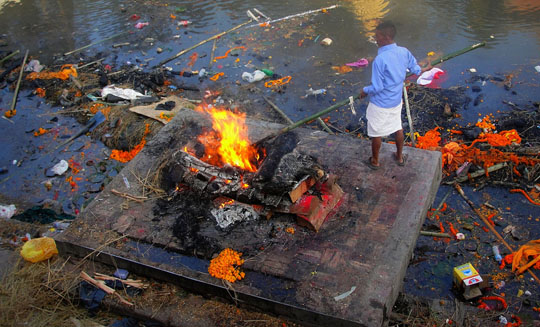New Delhi, Feb 3: Putting a question mark on centuries-old tradition of cremation by Hindus, the National Green Tribunal (NGT) on Tuesday said the procedure to cremate human remains in open area leads to air pollution and subsequently it also effects natural water resources.
Keeping in mind the growing level of pollution, especially in the national capital, the Tribunal asked the Union Environment Ministry and Delhi government to initiate programmes to provide alternative modes of cremation.
A brief outlook of the traditional system - After a person dies, as per Hinduism, the body is washed by family members and close friends as per tradition and later, it is cremated while following couple of religious procedures.
It is said that Hindus believe that soul of a dead person must be completely detached from the body and the material world, so that it can be reincarnated again. For this, an open cremation is needed so that the soul can be released easily as soon as the body is burned atop a massive pile of wood.
Many even use sandalwoods to form the death pyre.
The 'asthiyan' or the remains of the body along with the ashes are then submerged into the Ganges - the holy river.
Burning a body in the open and submerging the ashes into various rivers has been happening in India since ages.
However, it must be noted that there are a number of sects, sub-sects within Hinduism and traditions may vary according to different regions and their beliefs.
Now, the point here is, do these religious beliefs help to attain a person 'moksha' or does it cause an adverse effect on the environment?
NGT's direction - Pointing out the environment factor, a bench headed by Justice UD Salvi today said there was a need to adopt environment-friendly methods like electric crematoriums and use of CNG and change the “mindset of the people”.
“The issue involves question of faith and circumstances in which the people live, ... It is, therefore, the responsibility of the men who lead, particularly religious leaders, to steer the faith in a direction so as to change the mindset of people practising their faith and make them adopt practices which are environment-friendly.
“It is also the responsibility of the government to facilitate the making of the mindset of the citizens as well as to provide environment-friendly alternatives for cremation to its citizenry,” the bench said, directing authorities, including civic bodies, to educate the public in this regard.
The green panel further said the traditional means of cremation caused adverse impact on environment and dispersal of ashes in the river led to water pollution.
“Religions of the world, therefore, conceived of different methods for disposal of the dead on the basis of their theology and the circumstances in which the believers lived. Where there was plenty of wood, the individuals thought of disposal of their dead by burning with wood, but where there was scarcity of wood the individuals buried their dead,” it said.
The NGT was hearing a plea by advocate DM Bhalla who had said that cremation of humans by conventional methods added to air pollution, therefore, alternative modes of cremation needed to be used.
Bhalla contended that cremation of human remains by traditional method involving wood has serious impact on the environment as “the forest cover is sacrificed and obnoxious gases emanated from the burning of human mortal remains pollute the air.”
A second take - Taking note of the NGT's point of view, cloud of black smoke reaching upto the sky is a common sight in most open crematoriums in India.
According to some environmentalists, the ceremony of burning human bodies using wood, with the belief that it releases the soul, is actually a threat to the environment.
According to a report, in the whole year, around 50 to 60 million trees are burned during cremations in India.
Also, cremation in open grounds generate large amounts of ashes, which are later submerged into rivers and water bodies, especially the Ganga river.
So, are we really polluting our environment?
However, in order to tackle the environmental pollution, the concept of electric cremation was commissioned in India in January 1989, as a part of the Ganga Action Plan.
Well, it remains to be seen whether people would be ready to shed away their traditional belief and accept the change for a better cause.







Comments
Add new comment